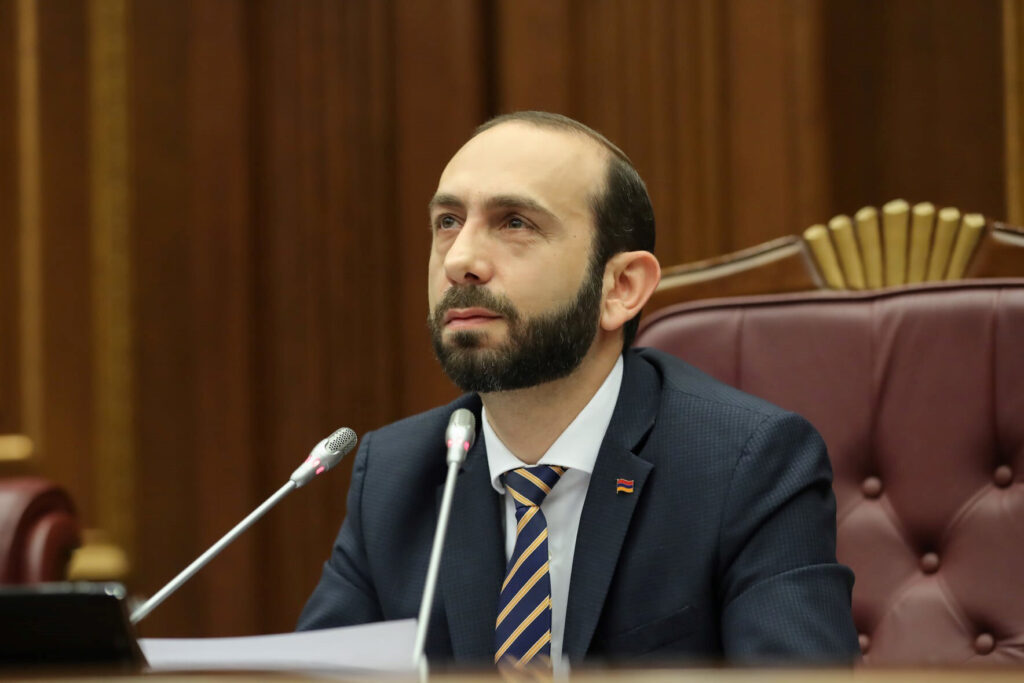Armenian top officials are optimistic about reaching an agreement on the remaining unsolved issues in a yet unsigned peace treaty, following a meeting of Armenian and Azerbaijani leaders in Kazan last week.
‘Now we have an understanding that there are one-two more [details] around which we will continue the work. This is a normal negotiation process’, said Armenian Foreign Minister Ararat Mirzoyan at the parliament on Thursday.
He expressed ‘cautious optimism’ that soon they would succeed in agreeing on those issues, after which the treaty ‘will be ready for signing’.
Mirzoyan’s statement came after Pashinyan and Aliyev held talks last week at the BRICS summit in Russia. The leaders instructed their foreign ministers to finalise a peace deal ‘in the shortest possible period’. Other details of the meeting were not made public.
On Wednesday, Arayik Harutyunyan, Pashinyan’s chief of staff, said such contacts were ‘useful’ and stated that the Armenian government ‘sees opportunity’ to resolve the outstanding issues in the peace treaty.
However, he refrained from commenting if Azerbaijan accepted Pashinyan’s offer to finalise the peace agreement ahead of the COP29 summit.
‘If there is a need for new meetings, there will be,’ said Harutyunyan.
On Thursday, Azerbaijan’s Foreign Minister Jeyhun Bayramov told the UK Foreign Ministry official Stephen Doughty that ‘there is serious progress in the process of negotiations on the peace agreement’ and that work is being carried out on the agreement.
He reiterated that ‘territorial claims’ against Azerbaijan in the constitution of Armenia are the main obstacle in the process.
COP29 and other issues
Earlier this week, Deputy Foreign Minister Paruyr Hovhannisyan suggested that Mirzoyan could represent Armenia at COP 29 in Baku scheduled to be held between 11–12 November. Azerbaijan earlier announced that an invitation had been sent to Mirzoyan.
However, Armenia has not yet officially announced its decision on whether it will actually participate in the summit.
Azerbaijani sources stated this week that Mirzoyan might possibly participate. The unofficial sources claimed that Azerbaijan could possibly release some Armenian prisoners during the event.
Mirzoyan has not ruled out Armenia’s participation, but said that ‘we must understand what it is about’, hinting that the release of Armenian prisoners could be part of their decision.
The day before Mirzoyan’s statement, Harutyunyan noted that Armenia’s decision would depend on various developments, including ‘serious progress within the framework of the peace treaty’.
In another development following the latest bilateral meeting, after Armenia’s ratification, Aliyev signed a regulation that would allow the demarcation process with Armenia to move forward.
At the parliament, Mirzoyan praised ‘very tangible results’ that had been achieved in the delimitation process. He noted that soon the sides would officially notify each other of the regulation taking effect.
‘After which I hope the delimitation works will continue’, Mirzoyan said, adding that no obstacles are presently visible.
Mirzoyan also touched upon the issue of unblocking transport and logistic connections, noting that there is ‘some positive atmosphere’.
‘We have conveyed proposals to the Azerbaijani side which have been welcomed in a semi-official way,’ he said, adding the two sides would continue to work on a mutual understanding on issues for which ‘it is possible to reach a general agreement at this stage’.
Turkey–Armenia Relations
Mirzoyan stated that the number one priority of Armenia’s foreign policy is to ensure peace and stability around Armenia, as well as the normalisation and development of relations with neighbouring states.
In response to a question from an opposition MP, Mirzoyan said that the Armenian Genocide international recognition process ‘is not our number one priority’.
The Armenian Genocide orchestrated by the Ottoman Empire between 1915 and 1923 resulted to the mass killings of nearly 1.5 million Armenians living in Western Armenia — modern-day eastern Turkey.
The Armenian Genocide is one of the main stumbling blocks in Armenia’s relations with Turkey, which as the successor state to the Ottoman Empire, denies that the genocide took place.
Mirozyan noted that Armenia and Turkey have a ‘dynamic’ and ‘positive’ dialogue, and expressed optimism for progress ‘in the near future’.
Mirzoyan said that Turkey conditions its relations with Armenia with the Armenia–Azerbaijan normalisation process, which Armenia assesses is ‘not a very constructive approach’. He noted that Armenia holds talks with Turkey ‘without preconditions’.




 31 October 2024
31 October 2024



